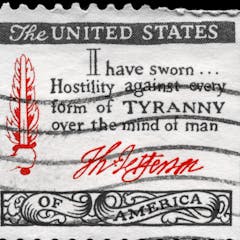
Articles on US history
Displaying 1 - 20 of 446 articles

Trump and the movement behind him is both new and old. Times are unprecedented but also, to historians of America, frighteningly familiar. Nick Bryant’s book excavates that history.

By putting financial pressure on white businesses – often in a highly organized way – Black civil rights leaders achieved social change.

More than 2,000 letters between the two founders are available online. Many attest to their deep commitment to religious freedom.

Lawyers, advocacy groups and think tanks are soliciting historians’ expertise on the history underlying certain Supreme Court cases. Yet this history-for-hire approach raises questions.

Amid rising unemployment, inflation and poverty in the 1830s, Philadelphia taxpayers believed welfare scammers were bleeding coffers dry. Poor lists from 1829 show they were wrong.

Human bondage was big business in the antebellum US, and men weren’t the only ones cashing in.

In the first wave to hit the beach, troops were met by withering German gunfire. But they kept pushing and established a small beachhead from which the invasion could continue.

Flagpoles outside homes owned by Justice Samuel Alito have displayed symbols used by Trump supporters and Jan. 6 insurrectionists.

May 2024 marks the 100th anniversary of the Immigration Act of 1924, which sharply cut the number of people allowed into the US.

A former archivist at Mary McLeod Bethune’s last residence in Washington, DC, recounts how the experience led her to see Bethune as a global figure.

Artifacts held in the National Museum of American History provide personal details about the Normandy invasion.

Few copies remain of the earliest known board game produced in the US.

Love it or hate it, the ‘Acela Corridor’ has developed a widely recognized identity thanks to the trains that link it together.

Most of the Klan’s victims were African American, but many other groups have been targeted during the hate group’s century and a half of history.

Two and a half centuries later, some things haven’t changed.

An attack on private property angered Colonial leaders as much as the British public – but a strong reaction from Parliament hardened the positions of the opposing sides, making compromise impossible.

Shoplifting has been hyped as a driver of chain-store closures, but did these companies ever really understand urban environments in the first place?

What’s in a name? A lot, if you’re an Audubon’s Oriole or a Townsend’s Solitaire.

New England has thousands of miles of stone walls. A geoscientist explains why analyzing them scientifically is a solid step toward preserving them

This isn’t the first time that US authorities have criminalized civil disobedience or framed grassroots organizing as a conspiracy.





